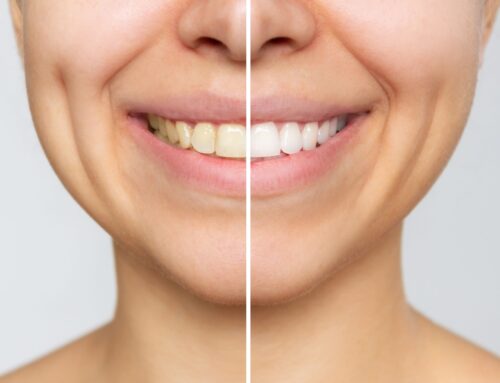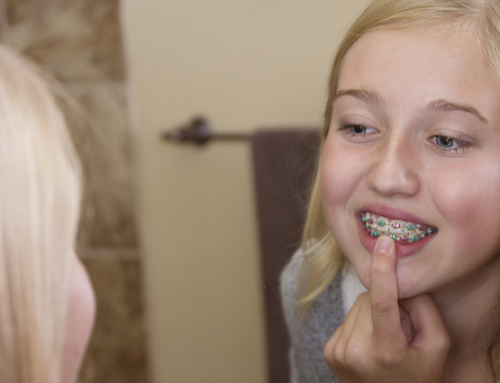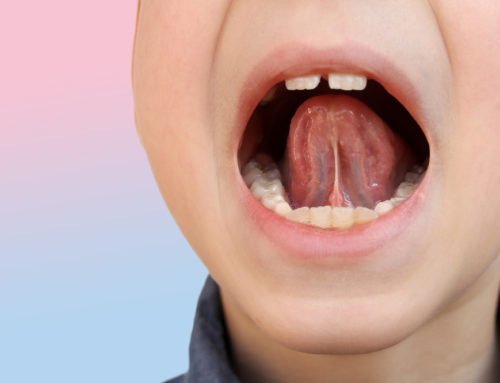Your Child’s First Dental Visit (and What You Should Know)
Parents always want what is best for their child, especially in those first few years of life. While your child’s toothless smile delights you now, a proper pediatric dentist can ensure that their smile will last a lifetime.
In the United States, tooth decay is the most chronic childhood disease of oral health. Most children in the United States do not have their first dentist appointment until they are five years old. However, the right time to visit the dentist is when their first tooth erupts from the gums, or on their first birthday.
Preventing tooth decay requires maintenance and a healthy routine. The teeth are just like other body parts. They need attention and care, and that care should start at an early age. Parents can reduce a baby’s exposure to decay by gently wiping the teeth and gums off with a damp cloth after meals, at bedtime and when they wake up. As soon as the first tooth arrives, a soft-bristled brush and water should be used to gently clean the tooth. Most dentists recommend weaning a child off the bottle by their first birthday. If sugary drinks are served, they should include a straw to reduce contact with the teeth.
When should you first see a pediatric dentist, and what should you expect to happen during that first visit? Read on to learn the basics!
When Should My Newborn Child See a Dentist for the First Time?
According to the Academy of Pediatric Dentistry (AAPD), there are two suggestions to when your child should see a pediatric dentist for the first time:
- No later than the age of 1
- Within 6 months of their first tooth coming in
While this first dental visit might feel a bit premature, it is still a crucial visit. Pediatric dentists encourage these early dental visits with young children for a few different reasons. For one, it allows pediatric dentists to detect potential dental problems like cavities, tooth decay, or gum disease and provide professional consultation for the treatment and prevention of these problems.
The first dental examination sets the mood for future visits. Dentists are aware of the fear that can come when visiting the dentist for the first time, but at Snodgrass-King, it is a top priority that your child’s first dentist appointment is a friendly, comfortable, and non-threatening experience. The first dental visit can bring a sense of familiarity to a child, which helps with the anxiety of future visits. Pediatric dentists can also guide parents in implementing healthy strategies to improve their child’s oral health habits. Lastly, a child’s first dental visit helps prevent future dental anxieties and phobias.
Signs You Should Take Your Toddler to the Dentist
Now that you have an idea of what age you should take your child to the dentist, let’s take a look at the top 5 signs that your child needs immediate dental care.
1. Toothache
A toothache can signify a variety of dental problems. However, in the case of infants, tooth decay caused by a baby bottle is a key reason for a toothache. It happens when the baby’s teeth are in continuous contact with sugars from baby food, fruit juice, and milk, resulting in the formation of bacteria in the mouth.
2. Swollen Gums & White Spots
Bleeding or swollen gums is a red flag that your tot could have a case of gum disease. Excess plaque in the mouth leads to swollen gums that bleed if touched. Having healthy gums is critical. Children should learn from an early age key habits for maintaining proper oral hygiene. If your child doesn’t receive treatment for hardened plaque, it can consequently result in loss of teeth later in your child’s life, before the underlying adult teeth is ready to come out.
An appointment with the dentist should also be scheduled quickly at the earliest signs of white spots on the teeth, near the gum line. White spot lesions are one of the first visible indications of tooth decay. Since initial tooth decay can occur without warning and advance pretty quickly, the sooner you can make the appointment, the better. Furthermore, regular dental appointments will help ward off and prevent tooth decay before it spirals out of control.
3. Tooth Sensitivity
Tooth sensitivity to hot and cold foods and beverages is a sign that your child might have a tooth cavity. The longer cavities go without getting filled, the more serious the discomfort and symptoms your child will experience.
4. Clicking or Popping Jaw
If your child’s jaw makes a popping sound or clicks when he/she chews, this may be a sign that they need braces. Those sounds are usually an indication of jaw misalignment. In turn, this typically signifies that the child has an under bite or an overbite. A visit to a reputable dentist can assist you in determining if your child requires braces. Then you’ll know whether or not you need to prepare your child for braces in the future.
5. Lip Sucking
Lip sucking is another habit that children pick up that can lead to the same problems caused by tongue thrusting, and thumb sucking, such as malocclusion, the misalignment of the teeth. However, it is important to note that malocclusion can also occur naturally as teeth develop, and could actually be the underlying cause behind your child’s lip sucking. If you see your child repeatedly lip sucking, it is instrumental to take them to a pediatric dentist, as early conditioning and counseling can help fix the malocclusion and/or assist the child in getting rid of the habit. Some signs of excessive lip sucking include swollen, irritated, and chapped lips, as well as irritated skin surrounding the lips.
What Procedures Will Take Place During My Child’s First Dental Visit?
Here are some things you can expect during your child’s first dental visit:
- Checking the Existing Teeth for Any Signs of Decay
- Young children are vulnerable to decay because their tooth enamel is thinner than adults. Thin enamel can put them at risk for developing cavities at an early age. To help prevent tooth decay in your toddler, we suggest that your child avoid drinks and foods with excess sugar. Bacteria feed on sugars and produce acids that erode tooth enamel.
- Examining Their Bite
- Pediatric dentists examine your child’s bite to assess the alignment of their baby teeth. Misaligned teeth, also known as malocclusion, can lead to an imperfect smile, improper speech, and chewing issues.
- Looking for Any Potential Problems With Gums, Jaw, Oral Tissues
- Young children can develop bleeding or swelling gums, jaw clicking and common mouth ulcers. All of which can cause significant discomfort to your child. With the help of pediatric dentistry, your child can easily receive treatment and learn about possible strategies for prevention.
- Gentle Teeth Cleaning
- Your child’s first dental cleaning usually is very short and rarely requires much treatment at all.
- Assess Fluoride Needs
- Fluoride is proven to be the best defense against tooth decay. Your dentist will be able to determine how much your child may need, and when, which is usually when their first tooth appears.
It’s normal for your child’s first dental appointment to be one of assessment and evaluation. It is unlikely that anything major will happen at this first checkup, but a beginning point needs to be established for your pediatric dentist to know how to move forward.
What Will I Learn During My Child’s First Visit to The Pediatric Dentist?
As a parent, there are things you are likely to learn regarding oral hygiene for your child. Some questions that will be discussed and answered at this first visit include:
- What are good oral hygiene practices for my child’s teeth?
- Brush at least 2 minutes twice a day.
- Begin flossing your child’s baby teeth when they start to touch.
- Keep baby utensils like teething rings and pacifiers clean of germs.
- Use a wet washcloth to clean your child’s gums after a meal.
- What fluoride needs does my child have?
- As mentioned before, young children are very susceptible to tooth decay. Fluoride in the form of mouth rinses, pastes, gels, and tablets are considered the best supplements in preventing cavities from forming. But, your child’s dentist will be able to determine what amount of fluoride to use.
- Should I be concerned about thumb sucking, tongue thrusting, lip sucking, etc.?
- It is common for young children and infants to do these things. However, it can cause dental problems to permanent teeth beyond the age of 5.
- What are the upcoming developmental milestones I can anticipate?
- Teething
- Losing the first tooth
- Braces
- Wisdom Teeth
- What should I do about teething?
- Babies are born with 20 teeth below their gum line, and teething will occur within 6 and 24 months. The teething process can vary depending on the baby, and teething symptoms are likely to occur. We suggest that you massage your child’s gums or give them a cold object to chew on to alleviate some of that discomfort.
- What are some tips for proper nutrition for oral health?
- Nutritional foods are essential in developing a healthy smile. Foods beneficial to oral health include calcium-rich foods, fruits, vegetables, proteins, and fluoridated water.
- What schedule should we set for my child’s dental visits?
- It is best to schedule routine checkups and cleanings every six months to ensure that your child has the perfect smile.
What Else Do You Learn at a First Dental Visit?
You dentist may also discuss the following during the first visit:
- Proper bottle-feeding and nursing techniques
- Proper brushing techniques, which include what toothbrush to use, how much toothpaste to use and what kind
- Proper flossing techniques and the best type of floss for children
- How and when to encourage your child to stop using a pacifier or their thumb for comfort
Snodgrass-King Pediatric Dentistry Services
We encourage you to keep track of your child’s oral progression and to schedule an appointment with us before your toddler turns 1. Our dental practice specializes in providing quality dental care that is also a fun experience for your little one!
An important note that you should be aware of before scheduling an appointment with our pediatric dentists.There are required patient information forms that need to be completed. Be sure to show up at our practice with all of your child’s relevant health information. Having all of this information readily available is important in understanding a child’s health and allows our pediatric dentists to provide the best care in Middle Tennessee!






